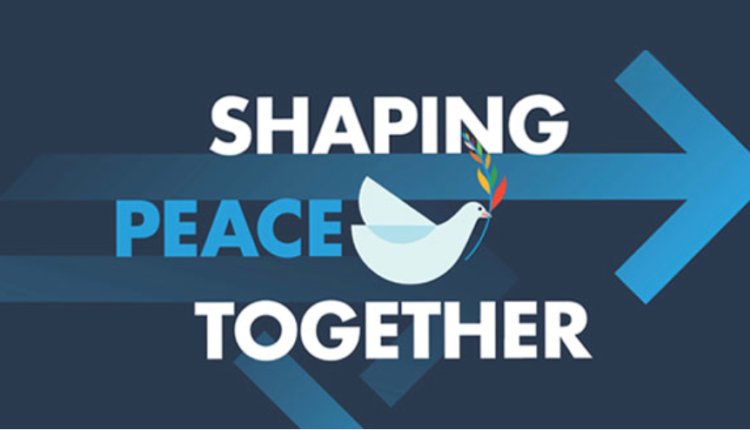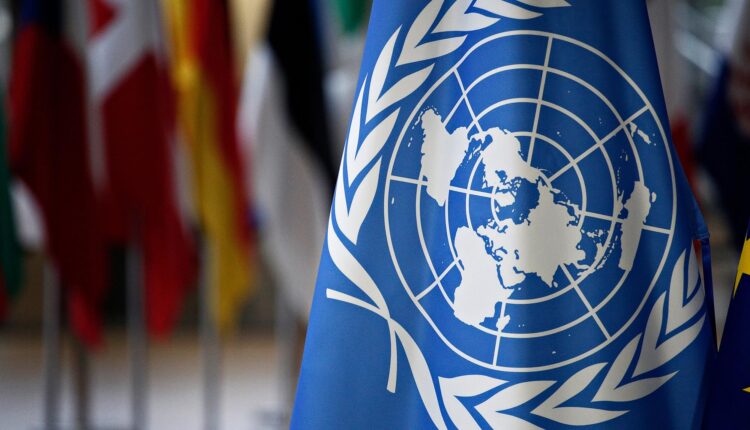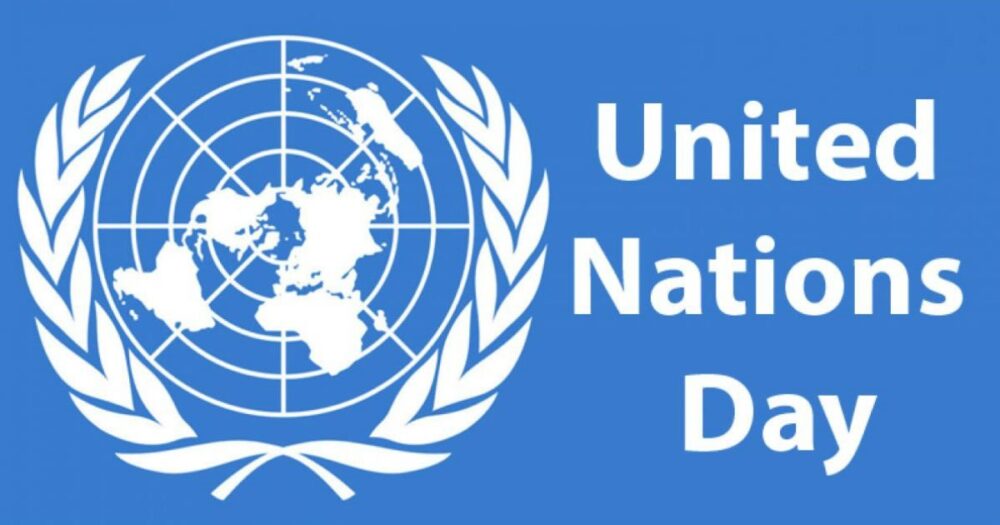United Nations Day marks the anniversary of the enforcement of the UN Charter in 1945. With the approbation of the ‘founding’ document of the UN by the majority of its signatories, including the five permanent members of the Security Council, the United Nations officially came into being as we know it today.
The theme for the 75th UN Day is ‘Shaping Peace Together’ The United Nations encourages people to ‘celebrate the day by spreading compassion, kindness and hope in the face of the (COVID-19) pandemic.’

There is, in fact, no other organization on par with global legitimacy, normative impact, and convening power as the United Nations. Today, the urgency for all the countries to come together, to fulfill the promises of the nations united, has rarely been greater, given the present circumstances.
24th October has been celebrated as United Nations Day since the year 1948. In 1971, the United Nations had also recommended that, this day should be observed by the Member States as a public holiday.

This year, it’s value has even heightened as the year 2020 marks the 75th anniversary of the United Nations and its founding Charter. This year’s anniversary comes in a time of great disruption for the world, compounded also, by an unprecedented global health crisis due to the ongoing COVID-19 pandemic, with severe economic and social impacts and not one but several war-level crises in the world. The celebration of the day not only signifies the anniversary of the UN but also, is a reminder that times of struggle can become an opportunity for positive change and transformation.
Without a question, the United Nations did come into existence at a time of great despair and global disharmony, when the ‘pen-holders’ of its founding documents and charter dared to imagine and put forward the idea of a better world, one that was to be defined by peace, compassion, and equality. Visionary world leaders then chose hope over cynicism, empathy over indifference, and partnership over distrust when they came together as the powerful drivers for change in San Francisco, on 26th June 1945 to sign and enact the Charter of the United Nations. They then embarked upon a new, rules-based world order, with an Organization of unrivaled legitimacy at its core; something the world had never seen before.

Over the years the UN has served as a ‘parliament of humanity.’ As the primary deliberative, policy-making, and representative body. It adopts resolutions across a wide breadth of issues that reflect the aspirations of humanity across the 3 pillars of the work of the United Nations: human rights, peace and security, and development.
The Charter of the United Nations sets out the objective of the UN to ‘save succeeding generations from the scourge of war.’ Accordingly, the UN has worked hard towards the goal of eliminating atomic weapons and all other weapons of mass destruction.

Nonetheless, the world has witnessed several changes, developments, both positive and negative, since 1945. Over the years, more than 80 former colonies have joined the Organization. The UN declared apartheid a ‘crime against humanity’.
The UN continues to promote equality and dignity for all, through the International Decade for People of African Descent with the theme ‘People of African descent: recognition, justice and development,’ and the International Day for the Elimination of Racial Discrimination, started to be observed every year on 21st of March.

It also adopted the Declaration on ‘The Rights of Disabled Persons’ in 1975; the Convention on the ‘Elimination of All Forms of Discrimination against Women’ in 1979; the Declaration on the Elimination of All Forms of Intolerance and Discrimination Based on Religion or Belief in 1981; the Convention on the Rights of the Child in 1989; and, more recently, the Declaration on the Rights of Indigenous Peoples in 2007.

In 2015, all the Member States adopted the 2030 Agenda for Sustainable Development. The Paris Climate Agreement began in an embryonic form as a General Assembly resolution at first. These twenty-first-century milestones of multilateralism demonstrate the recognition of Member States that collective action is required to combat an existential threat and safeguard the world’s citizens and the planet we inhabit for generations to come.
The United Nations, however, is not a panacea. Despite its multifarious efforts, conflict and strife persist, and in many cases, irreparable damage has been done to society. The horrendous genocide in Rwanda and the age-old question of Palestine remains unresolved. These are universally regarded as cases in which the international community has fallen short.

One of the most consequential organizations of the UN, the World Health Organization (WHO) has led the global response to the COVID-19 pandemic since the onset of the crisis. The United Nations has been the most effective in galvanizing support for the most vulnerable of all. In the General Assembly, Member States rallied to adopt resolutions calling for solidarity and global access to medicines and medical equipment. Bold historic steps have also been taken to further enable the United Nations during this period by adopting decisions under new rules and procedures to ensure easy implementation.
The 75th anniversary of the United Nations takes place at a consequential moment of reckoning for our shared planet and shared future. This is the most important time for action, ambition, and partnership, globally. By the 1st of July 2020, over 10 million cases had been reported to WHO and more than 500,000 people had succumbed to the effects of COVID-19. This pandemic has exacerbated pre-existing inequalities to alarming heights, and its socio-economic impact has been unprecedented in the history of our Organization. The Executive Director of the UN organization, World Food Programme, David Beasley, warns of a famine “of biblical proportions”; the United Nations Economic and Social Council reported that, “1.6 billion children are unable to attend school in person; and the pandemic continues to disproportionately affect women and vulnerable groups, such as refugees and internally displaced persons”.

Three-quarters of a century ago, the founding leaders of the United Nations Organization, demonstrated fortitude at a time of crisis. They chose to trust one another and unite in pursuit of a better world rather than feeding violence to the masses. In the inaugural address of the first President of the General Assembly, Paul-Henri Spaak stated, “It is possible that one day, in the future, the pessimists may be right; I do not know. But I do know that today they are wrong. In San Francisco, they then announced that the Charter could never be established; in London, that the Organization would never come into existence; in the past few weeks, that we should never meet again, and now, no doubt, that we are going to tear each other to pieces.”

Quick Facts You Probably Don’t Know About The United Nations-
- The Universal Declaration of Human Rights is the first document to detail the fundamental human rights that must be protected. The declaration was proclaimed in 1948.
- The annual UN Peacekeeping budget is less than 0.5% of global military spending.
- The UN’s World Food Programme (WFP) provides food and assistance to some 91 million people in 83 countries
- The UN and its agencies help over 1 million women a month overcome pregnancy complications. The UN Population Fund (UNFPA) works to make motherhood safer, among other responsibilities.
- The UN and its agencies supply vaccines to 45% of the world’s children. For example, the United Nations International Children’s Fund (UNICEF) and the World Health Organization (WHO) are core partners of the Global Polio Eradication Initiative, which has helped reduce polio cases by over 99% since 1988.
- The Paris Agreement on climate change was signed by the largest amount of countries ever in a single day.



